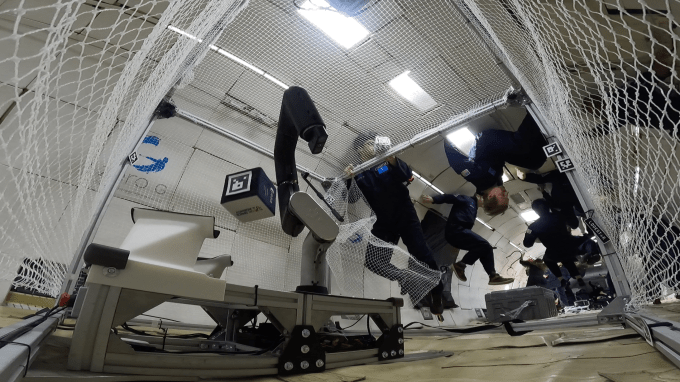Lodestar's robotic arm will be an orbital 'first responder' for satellites in need
Satellites are among our most critical infrastructure, providing everything from GPS to disaster coordination, yet their inherent inaccessibility leaves them vulnerable to relatively simple technical issues or attacks. London-based Lodestar is looking to change that with a “first responder” service in space using advanced robotic sentries.
Unlike some of its competitors who are also developing satellites for inspection and repair, Lodestar isn’t developing an entire spacecraft in-house. Instead, the company is developing a platform-agnostic robotics system, starting with a dexterous robotic arm, designed to inspect and repair assets on orbit.
The 18-month-old startup was founded by engineers Thomas Santini and Neil Buchanan. The two met at an incubator called Entrepreneur First, which helps founders find co-founders and start building their companies from the earliest stages.
“I basically turned up in London, thought I’d be in a room easily able to start a space company, and ended up in a room of about a hundred B2B SaaS founders,” Buchanan jokes. “I had to fight my way through to find [Thomas].”
The pair started out focused on 3D printing in space, but they realized that the market for that technology was not mature yet — and that terrestrial 3D printers are poorly suited for space. Instead, they started thinking about what those 3D printers would be attached to — the underlying robotics systems — and realized there was an opportunity to sell robotic services to commercial and defense customers.
“The kind of ‘hair on fire’ problem we found in space right now is security,” Buchanan explained. “There are some fundamental issues to do with space security that we just don’t have, at least in Europe, to match what countries like China and Russia are doing. We realized there was something really important we could do for national security right now that would help enable future commerce in space.”
The company has raised $2.5 million for its efforts, through a combination of non-dilutive funding from the U.K. Space Agency and a pre-seed round co-led by Inflection and Lunar Ventures, plus several angel investors. There are currently eight people on the team; its advisers include former SpaceX VP and ThinkOrbital CEO Lee Rosen and former Spaceflight CEO Curt Blake.
The team recently conducted the first zero-gravity testing of its electrical, mechanical and vision system in microgravity, in partnership with the Aurelia Institute and supported by academics from MIT Space Exploration Initiative, and is aiming to conduct an in-orbit demonstration with an uncooperative space asset by the end of 2025. The first system the company aims to send to space would be a single robotic arm that would demonstrate grabbing and releasing a target object within two meters.

Eventually Lodestar aims to have a high degree of interoperability — almost like a utility belt, with the arm able to swap in different end effectors or even a refueling interface.
“We’re bringing the ability to inspect, protect, and repair high-value assets in space in a way that’s truly scalable for the first time” Santini said. “As the industry moves towards proliferated capability, building a physical layer for autonomous interaction is going to be a bedrock technology that others will be enabled by.”
The company’s grant from the UK Space Agency includes developing a flight-ready model of its robotic arm that will fly as a hosted payload on an unnamed partner space tug next year. Lodestar's larger plans also include expansion to the U.S., no doubt to start catching the attention of the Department of Defense.
But still, the company says it sees a lot of interest from the U.K. government in homegrown capabilities to inspect and repair vital assets. “I see a lot of interest in European dynamism,” Buchanan said. While the U.K. Space Command works closely with the U.S. Space Force to ensure security in space, “there’s a growing demand for sovereign solutions,” he said.

